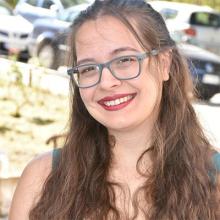Why is this research needed?
Every stroke is unique, which makes it very hard to predict whether or how quickly someone will recover after a stroke. This uncertainty can be very difficult for stroke survivors and their loved ones to cope with, and also presents practical problems for both survivors and healthcare professionals. For example, how do you know if you have reached a plateau in your recovery or whether you will keep getting better with more treatment? During her PhD, Margarita will investigate if it's possible to use artificial intelligence (AI) to make better predictions about recovering from aphasia after stroke and, importantly, whether the AI can 'explain' its decisions.
What are the aims of this research?
AI can keep track of much more information than a human, can process it more quickly and find subtle patterns in it. This makes it a powerful tool for making predictions, and is already known to be useful in other healthcare contexts like predicting when someone with epilepsy is likely to have a seizure.
However, most AI models are 'black boxes', which means that information goes in and an outcome comes out, but we have no idea what happens in between. This raises some ethical concerns about using black box AI to make healthcare predictions. If we don't know how a prediction was made, how can we trust it's the right one?
Margarita will attempt to turn her 'black box' models into 'white box' AI, which can not only make a prediction but show what elements were used to make it. If she's successful, this AI could be used to transparently predict language recovery after stroke.
Margarita will begin by training an AI program with brain scans and information about language ability from stroke survivors. During this stage, the AI is learning to spot patterns and make links between scans and language ability.
Next, Margarita will test how well the AI can predict what language ability and recovery will be like from different types of brain scans.
The prediction abilities of the trained and tested AI will then be improved by adding new information, like blood pressure. Margarita will work with stroke survivors, carers and clinicians to choose which information to use.
During all these phases, Margarita will also be trying out algorithms that can provide explanations of how the AI is working - that is, testing different ways to make the AI white box rather than black box. She will work with the stroke community to find out which explanations are most understandable and useful for the people who will use them.
What are the benefits of this research?
Margarita's work is a proof-of-concept for using 'white box' AI to predict recovery after a stroke. Assuming this goes well, she later plans to create materials to help clinicians and people affected by stroke understand how 'white box' AI works and to see whether it can be used in the real world, not just in the lab.
Margarita says, 'I will consider all the feedback I can get from people affected by stroke in order to create something that will aid clinical stroke practice in the most beneficial way for them and their lives after stroke.'
Ultimately, if she is successful, Margarita's work will provide us with more accurate and comprehensible predictions of language recovery after stroke. Stroke survivors and clinicians will have much more information about what is and isn't likely to work for them. This will make it much easier to personalise treatment for aphasia, saving time and effort.
What PSP priorities does this research link to?
From 2019 to 2021, we worked with the James Lind Alliance on the Stroke Priority Setting Partnership (PSP). During the PSP process, we collaborated with people with lived experience of stroke and stroke professionals to find out what they thought were the top priorities in stroke research. From this, we identified the top ten priorities in two areas: prevention, diagnosis and short-term care, and rehabilitation and long-term care.
Now, when a researcher applies to us for funding, we require that their work address at least one of these priorities.
Margarita's project addresses the following priorities:
- Rehabilitation 3: Communication difficulties.
- Rehabilitation 7: What is the best time, place and amount of therapy?
- Rehabilitation 10: Improving stroke survivor and carer experiences of treatment.
You can learn more about how the PSP worked and get a full list of stroke research priorities on the Stroke Priority Setting Partnership page.
Meet the researcher

Margarita Saranti is a computer scientist and a PhD student in the School of Psychology at the University of Birmingham. During this PhD project, she will be supervised by Professor Howard Bowman and Dr Pia Rotshtein.
Margarita says, 'I have had stroke survivors in my family and close environment, and I have seen how difficult having to deal with its consequences is. I want to help towards giving the families of stroke survivors the guidance, support, and relief I would have wanted to offer my own family.'
